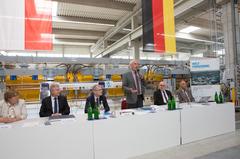URL: https://www.desy.de/news/news_search/index_eng.html
Breadcrumb Navigation
DESY News: Polish contribution to European XFEL successfully completed
News
News from the DESY research centre
Polish contribution to European XFEL successfully completed
At the successful conclusion of the Polish contribution to the construction of the European XFEL, a delegation including Maciej Chorowski, the director of the Polish National Centre for Research and Development (NCBiR), visited DESY and European XFEL. On this occasion, DESY renewed its cooperation agreement with the Polish Centre for Nuclear Research (NCBJ), which had coordinated the Polish contributions to the European XFEL.

At the signing ceremony: NCBJ Deputy Director Ewa Rondio, NCBiR Director Maciej Chorowski, NCBJ Director Krzysztof Kurek, DESY Director Helmut Dosch, NCBJ Deputy Director Zbigniew Golebiewski, European XFEL Director Massimo Altarelli (left to right). Credit: DESY/Marta Mayer
Massimo Altarelli, Chairman of the European XFEL Management Board added: “The contribution of Polish laboratories to the linear accelerator was crucial and very successful. This is why more recently, in 2015, we were happy to turn again to Poland to implement assembly of control electronics such as those for the instruments in the experiment hall.”
The NCBJ in Swierk, near Warsaw, is also the Polish shareholder of the European XFEL GmbH. Other Polish institutions also taking part in the construction of the accelerator are Wroclaw University of Technology (WUT) and the Henryk Niewodniczanski Institute for Nuclear Physics of the Polish Academy of Science (IFJ-PAN) in Krakow. The Polish in-kind contributions are valued at around 19 million euro (in 2005 prices). The total Polish contribution adds up to 26.5 million euro.
Chorowski, who himself has frequently been a guest at DESY, was thankful that the Polish institutions could strongly profit from the know-how acquired through their work at European XFEL. “This is also in particular a clear opportunity for the participating Polish companies to show their strengths while gaining valuable expertise and references”, said Chorowski.
On the occasion of the visit, DESY and NCBJ extended their long-time collaboration through another cooperation agreement. Both facilities intend to open the way for continuation and intensification of their collaboration not only in the framework of accelerator technologies, but also in fields of photonics research as well as development and application of free-electron lasers. Common experiments and data analysis in particle physics and particle astrophysics are also foreseen.



